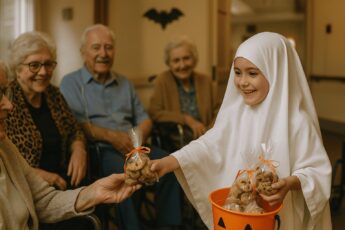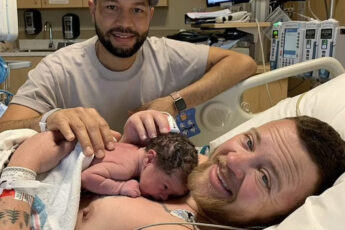“Mom, we’ve been thinking,” my son Oleg began cautiously, barely crossing the threshold. His wife Anya nodded eagerly from behind, her perfume thick and sugary, masking a nervous unease.
I sighed. “This always ends badly. Whenever you two start thinking.”
Oleg ignored me and walked into the living room, his eyes scanning the walls, the furniture — as if silently tallying up every item’s value. Anya fussed with a cushion, pretending to straighten what she had just shifted.
“We care about you,” she said in a voice dripping with sweetness. “You’re all alone, and at your age… anything could happen.”
I lowered myself into my old armchair, the fabric worn thin from decades of use. This chair knew more about my life than my own children did.
“For example?” I asked dryly. “That my blood pressure will skyrocket from all your ‘care’?”
Oleg frowned, impatience flashing in his eyes. “Why do you always start like this? The idea is wonderful! We sell your apartment and ours, take out a small mortgage, and buy a big house in the countryside! A garden, fresh air… You’ll be with the grandkids.”
His voice carried the practiced tone of a salesman. Anya clasped her hands dramatically, her eyes shimmering with artificial tears. A fine actress, that one.
I studied them — their rehearsed smiles, their fake warmth. But in their eyes burned only one thing: greed. Not love. Not care. Just hunger for square meters and money.
That was the moment everything became crystal clear. The cruelest betrayal isn’t from enemies. It’s when your own children whisper “we love you” — while plotting to strip you of the roof over your head.
I smiled faintly and asked, “And this big new house… whose name will it be under?”
“Well, ours, of course,” Anya blurted out — then immediately bit her lip. Oleg shot her a furious look.
“Just so you won’t have to deal with paperwork, Mom,” he jumped in quickly. “We’ll handle everything for you.”
I rose slowly, walked to the window, and looked at the street below — people rushing, carrying their own troubles, fighting their own battles. And I stood there, facing mine: surrender… or war.
“You know, children,” I said calmly, still gazing outside, “your idea is interesting. I’ll need time to think.”
A sigh of relief echoed behind me. They thought they’d already won.
“Of course, Mom, take your time,” Anya chimed, her voice sickly sweet.
I turned and looked them dead in the eyes. “Only, I’ll be doing my thinking here. In my apartment. And you’d better be going now — I’m sure you’ve got mortgages to calculate and house plans to measure.”
Their smiles faltered. They understood: this wouldn’t be easy prey.
The very next day, their campaign began. Oleg called every morning, chirping about “amazing plots of land” with pine trees and a river for the grandkids. By afternoon, Anya’s syrupy voice would follow:
“We’ll bring your favorite chair, Mom! Your ficus! You’ll have your own bathroom, your own window looking out onto the garden. You’ll be so happy…”
They pressed every weak spot — loneliness, health, grandchildren. But I wasn’t the fragile woman they imagined. I had lived too long, survived too much.
One call to my old friend Lyuda, who once worked at a notary’s office, gave me the clarity I needed. She shook her head firmly over steaming tea.
“Nina, don’t you dare sign the deed over. They’ll toss you out without blinking. If anything — a life-support contract, with legal care obligations. But they’ll never agree to that. They want it all. And they want it now.”
Her words strengthened me. I wasn’t a victim. I was a soldier on my own battlefield.
The final act came on Saturday. The doorbell rang. On my threshold stood Oleg and Anya — and behind them, a stranger in a slick suit holding a folder.
“Mom, meet Igor. He’s a realtor,” Oleg announced casually, striding in as if he already owned the place. “He’ll just take a quick look, you know… assess our asset.”
The man’s sharp eyes swept across my home, measuring walls, ceilings, parquet floors. He didn’t see the memories, the life, the decades. He saw only square meters. Liquid cash.
And something inside me snapped. All the patience I’d hoarded vanished.
“Assess what exactly?” I asked, my voice suddenly steel.
The realtor froze, caught off guard by the edge in my voice. Oleg tried to cover the silence with a forced laugh.
“Mom, don’t be dramatic. We’re just looking at options—”
I cut him off, my voice cold and clear:
“You’re not looking at options. You’re looking at my home. Every crack in this wall, every scratch on this parquet — it’s my life. And I won’t let you turn it into square meters and banknotes.”
Anya gasped, clutching her bag. “But Mom, we only care about your comfort!”
I stepped closer, staring her straight in the eyes.
“Comfort? That’s the word you use when you mean profit. You think I don’t see it? You talk about gardens and bathrooms, but your eyes light up only at the thought of selling this apartment.”
Oleg’s face reddened. “So what, you want to rot here alone? This place is too big for you, you can’t even—”
“Enough!” My hand slammed against the arm of my chair. My voice rang out louder than I thought possible for my sixty-nine years.
“You think I’m weak? That I’ll sign away my life just because you call me ‘Mommy’ in a sweet voice? No. I have already spoken to a notary. This apartment stays with me until my last breath. And if you keep pushing me — not a single kopek will you see, not a single square meter.”
The room went silent. Even the realtor shifted uncomfortably, suddenly realizing he had walked into a family war.
I turned to him calmly.
“You can leave now, young man. There’s nothing to assess here.”
He hesitated, then gathered his papers and muttered, “Of course… excuse me,” before slipping out the door.
I looked back at my son and his wife. Their smugness was gone. Oleg’s jaw was clenched, Anya’s eyes darted nervously. For the first time, they realized: their prey had teeth.
“You wanted a war?” I said quietly. “You’ve got one. But remember this — I’ve lived through more battles than you can imagine. And I’ve never lost.”
They left without another word.
That evening, I sat alone in my chair, the silence of the apartment wrapping around me like an old, loyal blanket. Outside, the city hummed with life. Inside, I felt no fear. Only strength.
At sixty-nine, I had finally understood: sometimes the greatest act of love toward your children is to not give them what they ask for. Because what they ask for isn’t love — it’s your life.
And my life… was still mine.







